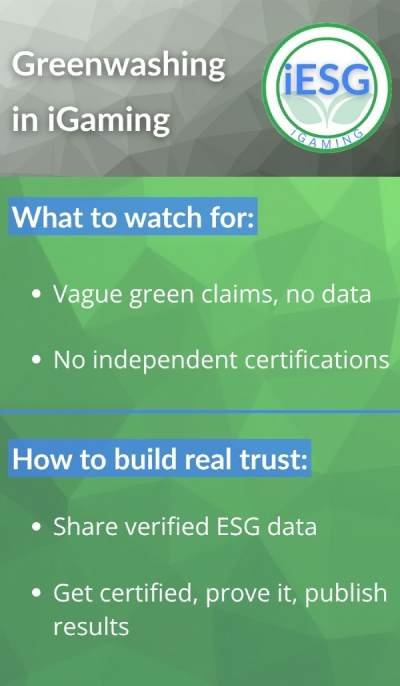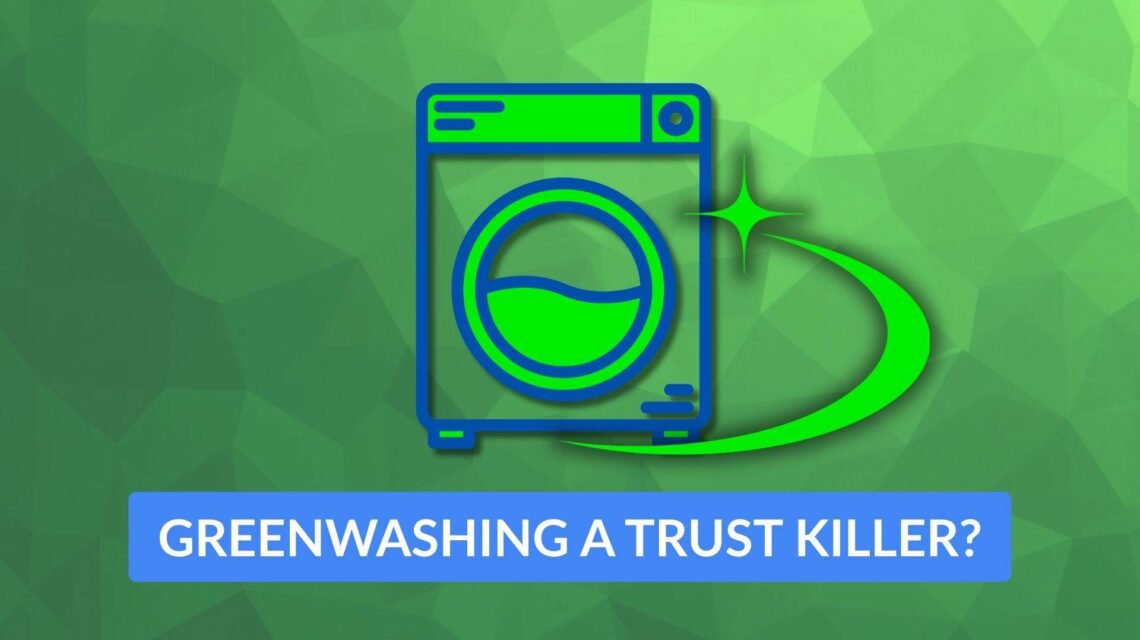In the race to capture player loyalty and investor confidence, the word “sustainability” is becoming increasingly “popular” in iGaming. Yet, not all green claims are created equal. The EU and UK are tightening regulations and players demanding more transparency. A consequence: greenwashing in iGaming has become a growing threat to trust, compliance, and bottom lines.
70% of players drop their trust in brands if sustainability promises seem inflated, a 2024 survey by the UK Gambling Commission found out¹. This is more than just a little bit of a reputational issue. Regulators, partners, and shareholders are scrutinising what’s the real deal and what just makes for a good PR.
We break down what greenwashing in iGaming looks like in practice. Why the consequences are escalating, and how only real, verified ESG can protect brands and unlock long-term value in today’s market.
What is greenwashing in iGaming and why does it matter?
Greenwashing is the process of conveying a false impression or misleading information. In iGaming, this might look like banners promising “100% green gaming,” sustainability “pledges” with no follow-up data, or slick annual reports that skip the real numbers. Unlike other industries, iGaming operators in the EU and UK face a higher standard: claims are subject to ASA and FCA enforcement, and the European Commission’s upcoming Green Claims Directive will soon require all environmental statements to be substantiated by independent evidence².
If an operator is caught greenwashing, the consequences hit fast. The ASA is already issuing penalties for misleading green claims³, and under the new EU rules, brands could be forced to retract marketing or face fines. But the bigger risk is loss of trust from both players and B2B partners. In a market where one scandal can erase years of goodwill and even impact licensing, greenwashing isn’t just a bad look. It’s a direct threat to long-term success.
📊 Want to ensure your ESG claims are backed by real substance?
Use our iESG Assessment to benchmark your environmental practices, identify compliance gaps, and avoid falling into the greenwashing trap. It’s free, fast, and built specifically for iGaming.
Common red flags: how to spot greenwashing in iGaming
While most operators want to “look green,” the telltale signs of greenwashing are surprisingly consistent.
- Vague “feel-good claims”: Watch for statements like “eco-friendly casino” or “committed to sustainability”. No real data, benchmarks, or third-party validation? You know what’s going on …
- No independent certification: Authentic brands usually have external badges, such as ISO 14001, or industry ESG credentials. If there’s nothing, ask why.
- Gestures over substance: Some brands tout one-off events, donations, or Earth Day promos, but offer no ongoing, integrated sustainability practices.
- Lack of clear ESG reporting: Operators that publish no annual data, targets, or progress updates are lagging behind.
- Misleading visuals: It’s an old trick in greenwashing, using nature imagery or green icons with no connection to actual action or results.
Greenwashing in iGaming isn’t just a marketing slip-up. Each is a warning that the ESG foundation is weak or worse, built on empty promises. And that highlights a way bigger problem – a fundamental trust issue. Nothing any iGaming platforms wants …

How Operators Can Build (and Prove) Real ESG Trust
Today, credibility and transparency are far more valuable than glossy sustainability pledges or some simple greenwashing in iGaming marketing stints. Here’s what actually works:
#1. Credible third-party certifications
Credible third-party certifications that fit the iGaming context are the way to go. ISO 14001 for environmental management or sector-specific standards like our iESG Certificate.
🎯 Unlike generic frameworks, the iESG Certificate is tailored specifically to the realities of the gambling industry, combining independent verification with benchmarks that truly reflect operator responsibility. An external audit isn’t just about compliance, it’s a signal to players, partners, and investors that your ESG strategy has teeth.
#2. Publishing ESG reports
Vague commitments don’t cut it anymore! Publishing clear, verifiable ESG reports is the name of the game in 2025. This means sharing the numbers: carbon footprint, energy usage, diversity statistics, and community initiatives. Operators should set real, public targets, track progress, and, where possible, map performance to frameworks like the EU’s CSRD.
#3. Staying ahead of evolving regulations
It’s also relevant to stay ahead of evolving regulation. Compliance isn’t static. Marketing and compliance teams must continually check that all public claims meet UKGC, ASA, and EU requirements.
#4. ESG becomes part of company culture
When ESG values morph into company culture it starts to empower employees. Subsequently sustainability becomes part of daily decisions. Not just annual reports. When staff see that ESG is more than a slogan, authenticity follows in all operational aspects.
#5. Honest Communication
Honest communication is essential. Sharing wins and even setbacks foster credibility. Graphics, dashboards, and summaries can help demystify ESG for players and investors alike.
The end result? Operators who focus on real, sustained progress rather than box-ticking or PR are building trust that pays dividends.
From Compliance to Competitive Edge: Turning ESG Credibility into Business Value
Getting ESG right isn’t just about avoiding trouble. It’s a business multiplier. According to PwC, 78% of UK and EU consumers say they prefer brands with visible, credible sustainability action⁴. The result is tangible: greater player loyalty, stronger investor interest, and easier access to new markets and partnerships.
Institutional investors increasingly screen for ESG transparency, meaning that operators who are serious about reporting and certifications can attract capital that others can’t. At the same time, regulators in both the UK and EU are rapidly raising expectations. Those who lead on transparent, independently verified ESG reporting will be the first to benefit as new standards become mandatory.
And of course, the brand impact is real. In a crowded market earning authentic trust is the best way to stand out in contrarst to damaging the brand reputation by utilising greenwashing in iGaming tactics. And, to prepare for whatever the next regulatory wave brings.
Conclusion: Greenwashing in iGaming
Greenwashing in iGaming is more than a passing trend. It’s a central credibility issue for the industry’s future. As the EU and UK raise the bar, operators who prove their ESG credentials through action, will win loyalty. They’ll build value, and avoid the penalties and reputational hits that come from empty claims. In a sector where reputation is everything, there’s no substitute for the real thing.
FAQ – Greenwashing in iGaming
What is greenwashing in iGaming?
Greenwashing in iGaming is when operators exaggerate or mislead about their environmental or social impact to appear more sustainable than they are.
Why is avoiding greenwashing in iGaming important for brands?
It protects reputation, ensures regulatory compliance, and builds trust with players and partners.
What regulations address greenwashing in the EU/UK iGaming sector?
The UK Advertising Standards Authority (ASA), the Financial Conduct Authority (FCA), and the European Union’s Green Claims Directive all require that sustainability claims are accurate and fully substantiated.
How does credible ESG benefit iGaming operators?
It attracts loyal players, investment, and ensures compliance, turning sustainability into a competitive edge, in contrast to greenwashing in iGmaing that damages and harms the brand reputation.
Sources:
- UK Gambling Commission: “Gambling Survey for Great Britain 2024“
https://www.gamblingcommission.gov.uk/statistics-and-research/publication/gambling-survey-for-great-britain - European Commission: “Green Claims Directive”
https://environment.ec.europa.eu/topics/circular-economy/green-claims_en - UK Advertising Standards Authority (ASA): “New Zealand Online Casino Licensing Regime”
https://www.asa.org.uk/news/green-claims-guidance.html - Financial Conduct Authority (FCA): “ESG and sustainability disclosure rules”
https://www.fca.org.uk/news/statements/sustainability-disclosure-requirements-consultation - PwC: “2024 Voice of the Consumer Survey”
https://www.pwc.com/gx/en/news-room/press-releases/2024/pwc-2024-voice-of-consumer-survey.html - BDO: “ESG Strategy for Gaming“
https://www.bdo.com/insights/industries/gaming-leisure/gaming-companies-unlock-the-power-of-esg-strategy-and-investment

